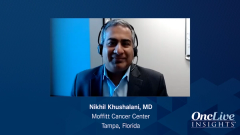
Deciding Between Melanoma Therapy Options
A panel of skin cancer experts share their thoughts on treatment selection for patients with melanoma.
Episodes in this series

Transcript:
Sunandana Chandra, MD, MS: To expound on that a bit more, Dr Pavlick, when you’re thinking of a combination immunotherapy approach for a patient, how do you decide between the 2 combinations that are FDA approved?
Anna C. Pavlick, MD: I would like to know that answer too. I think you need to look at the toxicity profile. If you’ve got someone who is ill or elderly or has multiple medical issues, whom you don’t think can tolerate a full dose of ipilimumab/nivolumab with a 50% toxicity risk but you’d like to offer them maybe a bit more than just a single-agent PD-1, you [may] want to give them PD-1 and relatlimab. It has a little higher toxicity profile than nivolumab alone, but it’s certainly not the same toxicity as ipilimumab/nivolumab. How do you pick? I think it is your patient assessment.
Sunandana Chandra, MD, MS: For patients who have BRAF mutations, you touched earlier on the potential to use triplet therapy. What are some of the scenarios where you would consider using a BRAF/MEK inhibitor as well as an anti–PD-1? To either of you;Dr Pavlick, how about you?
Anna C. Pavlick, MD: [Do you have] a coin? That’s how you pick.
Nikhil Khushalani, MD: I don’t use it in the frontline setting at all. I have used it in patients who are refractory. I will preface this by saying, that’s off-label use, but I will use it in the refractory setting where I don’t have a clinical trial and they’ve been exposed to all of the preceding agents. Again, anecdotally, we have seen some responses to that. There’s an ongoing effort to try to collate our data and understand what that response is. Although there is a triplet combination approved in the frontline setting—vemurafenib, cobimetinib, plus atezolizumab—I’m not convinced that is necessarily better than sequential therapy. In those patients, I would much rather use the sequential use similar to the SECOMBIT trial, where you give them 8 weeks of targeted therapy and then electively switch to immunotherapy. Again, those are few and far between, the ones who present with extraordinarily aggressive disease where you literally have to achieve control in a matter of days.
My concern with triplet therapy is toxicity and attribution of toxicity, particularly hepatotoxicity in those patients. When they develop transaminitis, it is unclear whether that is due to immunotherapy and they need steroids, or whether it’s due to the targeted therapy and all you need to do is stop the targeted therapy for those patients to get better. That confounds the matter in my mind, and therefore I would much rather keep it cleaner for the patients.
To follow up on the previous question, which combination immunotherapy is preferred? I agree there is no necessarily frontline choice. With the CheckMate 067 study, we now have the longest follow-up data for ipilimumab/nivolumab at 6.5 years. We have an almost 50% overall survivorship with that. But yet, as Dr Pavlick mentioned, about a third of patients had to discontinue therapy due to toxicity. More than 50% of them developed grade 3 or higher toxicity. That’s not trivial.
The data with nivolumab/relatlimab are still early, but I anticipate we will continue to see maturation of the data. The discontinuation rate was only about 9%, so significantly better. That being said, I’m still biased because of the longer follow-up with ipilimumab/nivolumab. If I have a patient with high LDH [lactate dehydrogenase], bulky disease, symptomatic disease, patients with metastatic mucosal melanoma who don’t respond as well to single-agent anti–PD-1 therapy, or even metastatic acral melanoma, and certainly those with asymptomatic metastatic brain disease, I will preferentially use combination ipilimumab/nivolumab for those patients.
Transcript edited for clarity.






































